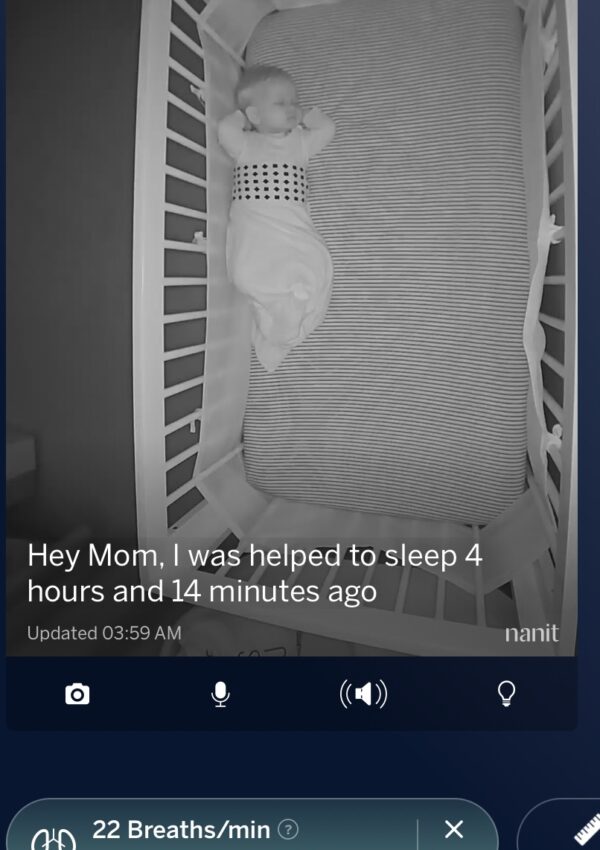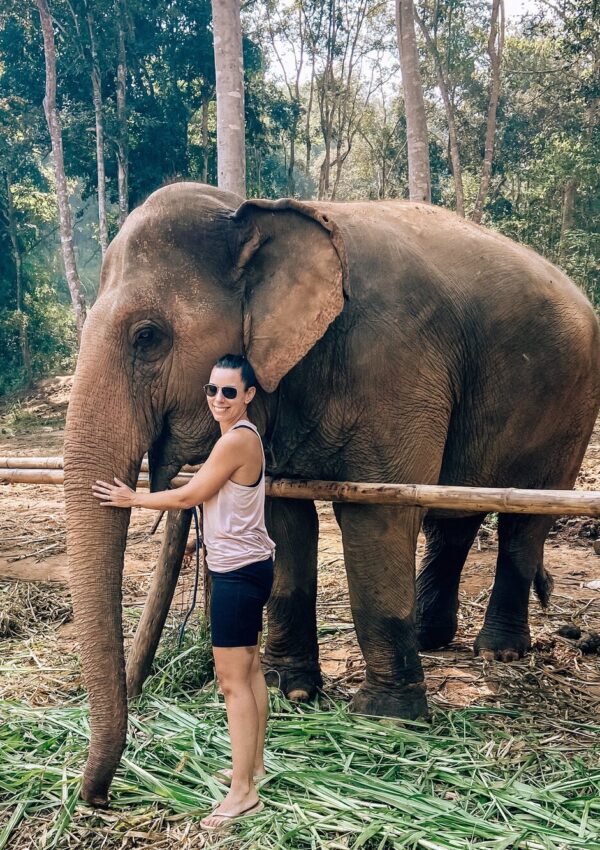So you’ve decided to go camping with a toddler in the great outdoors. Congratulations! You are brave! I recently did the same when I took my 15 month old tent camping by myself for the first time. It’s a good idea to be as prepared as possible in advance so I’ve put together everything you need: my tips for camping with a toddler, checklist, and more.

Tips for Camping with a Toddler
I did a trial run with my 1 year old at a campground close to home as our first trip so that if things didn’t go according to plan, we could always go home without worrying about a major road trip ahead of us. I’d suggest doing the same thing, even camping in your backyard without the ‘comforts of home’ is a great option just to get a feel for it. You don’t want to be a long way from home if your first camping trip doesn’t go well. And with young children, you just never know!

How to Choose a Location with Camping with a Toddler
When choosing your campsite, do some research into the location of the site. I chose one that looked to be a bit quieter. It backed onto a forest and mountain, and was away from the group camping areas. It also had a water source and toiler nearby. Plus there was a play area that we could easily walk to when we wanted. It really was the perfect place.
Sleeping Tips for Camping with a Toddler
I have an old cell phone with a white noise app that I keep specifically for travelling with my baby. I took it with me thinking that I’d need white noise machine for any potentially loud neighbours. What it was actually useful for for drowning out the sounds of nature. While I realize that sounds counterintuitive when you’re on a camping trip, there were a lot of bird sounds and such that were loud and startled my little one. The white noise really helped drown that out so we could get a good night’s sleep.

I did a lot of research into what I would dress Lachlan in to sleep, Initially I thought I wanted a traditional sleeping bag (there are some great toddler sleeping bags on the market) but since my toddler sleeps on his stomach, I didn’t think we were ready for that quite yet. So I used one of our heavier sleep sacks and put him into several layers of clothes and some extra blankets (which I didn’t end up needing), and it worked perfectly. If you have merino wool, that would be a great, breathable option for your toddler to wear. Perhaps next summer he’ll be ready for his own sleeping bag but this worked great for me in the meantime.
Much of the reading I’d done recommended using a pack n play or portable crib in the tent. I absolutely did NOT want to do this if at all possible. The whole reason I wanted to take Lachlan on his first camping trip was to keep things simple. So I took the mattress that I bought for his pack n play and brought that instead for him to sleep on. Since he still sleeps on his stomach, I thought this would be the best way to keep him safe at night as well. I rolled out my thermarest and sleeping bag next to him, then put our bags on the other side of him in case he rolled in that direction in the night.
Camping with a Toddler: Mealtime
Things might be a bit different if I was taking young toddlers on a family camping trip with the whole family but since I was going to be solo, I had to give a lot of thought to how I could safely and efficiently prepare meals with a little person running around.

I brought a camp stove and kettle, and prepared most of our meals in advance. Fresh fruit, pre-cut vegetables, crackers, and cheese were easy snacks to have on hand. Other food like pasta and oatmeal travel well and are quick and easy to pack so I highly recommend those staples. The stove and kettle were mostly used for clean up. I also recommend bringing lots of baby wipes for a quick wash of your toddler’s face and hands.
One other key item: a Perch clip on baby chair or lobster chair. Having my toddler safely strapped in to his seat at the table allowed me to move freely while I prepared our meals and cleaned up. It kept him from being underfoot but also allowed him to watch everything I was doing.
How Do You Entertain a Toddler While Camping?
When it comes to entertaining a toddler while camping, here are some fun and engaging activities to consider:

- Nature Exploration: Take short nature walks or hikes together, pointing out interesting plants, rocks, and animals along the way. Encourage them to touch leaves, listen to bird sounds, and explore their surroundings.
- Scavenger Hunt: Create a simple scavenger hunt by making a list of items commonly found in the campground or surrounding area, such as pinecones, different colored flowers, or smooth stones. Let your toddler search for and collect these items.
- Sensory Play: Bring along some sensory toys or materials, such as sand, water, or playdough, that allow your toddler to engage their senses. They can build sandcastles, splash in water, or squish and mold playdough.
- Nature Crafts: Collect natural materials like leaves, sticks, and pine needles, and use them to create simple nature-inspired crafts. Help your toddler make leaf rubbings, pinecone animals, or stick sculptures.
- Storytelling and Songs: Gather around the campfire or in the tent and tell stories or sing songs that are age-appropriate and engaging for your toddler. Use hand gestures and facial expressions to make it more interactive and entertaining.
- Camping Games: Play simple camping games like “I Spy,” “Simon Says,” or “Duck, Duck, Goose” that can be adapted to the camping environment. These games promote movement and fun interaction.
- Stargazing: During clear nights, lay out a blanket and spend some time stargazing with your toddler. Teach them about constellations or simply marvel at the beauty of the night sky together.
- Quiet Time Activities: Bring along quiet activities such as coloring books, picture books, or puzzles that can be enjoyed during downtime or in the tent.
Remember, toddlers have short attention spans, so be prepared to switch activities frequently and adapt to their interests. Keep safety in mind and supervise them closely during all activities. Enjoy the quality time together and embrace the natural wonders of the camping experience!
Camping with a Toddler, Your Questions Answered
Can You Take a 2 Year Old Camping?
Yes, you can take a 2-year-old camping! Camping with a 2-year-old can be a wonderful and enriching experience for both the child and the family. However, it requires careful planning and consideration of the child’s needs and safety. Choose a family-friendly campground, ensure a safe sleeping arrangement, pack appropriate clothing and essentials, and plan age-appropriate activities to keep your child engaged. Supervision and attention to their health and well-being are crucial. By taking these factors into account, you can create a positive camping experience for your 2-year-old.

Is it safe to take a 2 year old camping?
If you’re considering taking your 2-year-old camping, it can be a fantastic experience, but it requires careful planning. Make sure your child is healthy and choose a family-friendly campground with necessary facilities. Provide a safe sleeping arrangement and protect them from insects and the sun. Keep a close eye on them, maintain good hygiene, and plan age-appropriate activities. Remember to consider their individual needs and temperament, and consulting a paediatrician can provide further guidance.
What Should a 2 Year Old Sleep in While Camping?
When camping with your 2-year-old, it’s important to provide a safe and comfortable sleeping arrangement. Consider using a portable crib designed for camping, which is lightweight and easy to set up, or opt for a toddler-sized sleeping bag that provides warmth in cold weather and fits them well. Alternatively, a pack ‘n play or an air mattress with fitted sheets and safety rails can create a cozy sleeping space. Ensure the sleeping area is away from potential hazards, keep bedding minimal, and check on your child during the night to ensure their comfort and safety.

What is the Best Age to Start Camping with Kids?
The best age to start camping with your kids can vary. I took my little guy camping by myself when he was 15 months old. However many families find that starting around 3 to 4 years old is a good time. At this age, children are typically more able to follow instructions, communicate their needs, and engage in basic outdoor activities. As they grow older, around 5 or 6 years old, their understanding and enjoyment of camping tend to increase. Remember, every child is unique, so consider their individual needs and abilities when deciding on the right age to start camping. Start with shorter trips and gradually increase the duration and complexity of the camping experience as your child grows more comfortable with outdoor settings.
Camping with a Toddler Checklists
What Should I Pack for a 2 Year Old Camping?
When packing for a camping trip with your 2-year-old, it’s important to be well-prepared. Here’s a packing list of essential toddler camping gear:
- Clothing: Pack weather-appropriate clothing, including comfortable play clothes, extra layers for cooler temperatures, socks, and sturdy shoes. Don’t forget hats and sunglasses for sun protection.
- Bedding: Bring a portable crib, toddler-sized sleeping bag, or a pack ‘n play for your child to sleep in. Include fitted sheets, blankets, and a favorite stuffed animal or blanket for comfort.
- Diapers and Wipes: Carry an ample supply of diapers, wipes, and diaper rash cream, if needed. Consider using disposable diapers for convenience while camping.
- Food and Snacks: Pack a sufficient amount of your child’s preferred food and snacks. Bring easy-to-eat, portable options such as pre-cut fruits, granola bars, yogurt pouches, and finger foods. Don’t forget water bottles, sippy cups and bibs.
- Feeding Supplies: If your child is still using bottles or sippy cups, pack enough for the duration of your camping trip. A small cooler is a great way to store perishable items. Consider using reusable food storage containers, too.
- Personal Care Items: Include items like child-safe sunscreen, insect repellent, hand sanitizer, and a basic first aid kit with band-aids, antiseptic ointment, and any necessary medications.
- Hygiene Essentials: Bring travel-sized toiletries like baby wash, shampoo, and lotion. Don’t forget wet wipes, bath towels, washcloths, and a bathtub or basin for bathing if necessary.
- Entertainment and Comfort: Pack age-appropriate toys, books, and favorite comfort items to keep your child entertained and comforted during downtime.
- Outdoor Gear: Include items like a stroller, baby carrier or backpack carrier for hikes, a sunshade or hat for sun protection, and a small portable chair or blanket for seating.
- Safety Items: Bring a baby monitor if needed, childproofing supplies such as outlet covers or cabinet locks if applicable, and a flashlight or headlamp for nighttime.
Remember to adjust the list based on the specific needs and preferences of your child. It’s also a good idea to check the campground amenities in case any items can be acquired or rented on-site.

How Do I Prepare My Toddler for Camping?
Preparing your toddler for camping involves a combination of familiarizing them with the concept of camping, addressing their needs, and ensuring their comfort and safety. Here are some steps to help you prepare your toddler for a camping trip:
- Talk about Camping: It’s a great idea to introduce the idea of camping to your toddler by talking about it in a positive and exciting way. Use books, pictures, or videos to show them what camping is like and the fun activities they can expect.
- Set Up a Practice Campout: Create a mini-campout experience at home or in your backyard to familiarize your toddler with sleeping in a tent or a sleeping bag. Use this opportunity to make it fun and enjoyable, reading camping stories, playing camping games, or having a picnic-style meal.
- Pack Together: Involve your toddler in the packing process. Let them help gather their clothes, toys, and other essentials, giving them a sense of involvement and anticipation for the trip.
- Talk about Nature: Teach your toddler about nature and its wonders. Discuss the plants, animals, and outdoor elements they might encounter during the camping trip. This can foster curiosity and excitement about the natural surroundings.
- Practice Outdoor Skills: Take your toddler on short outdoor adventures like walks in the park or nearby nature trails. This can help them become more comfortable with being outdoors, walking on different terrains, and observing their surroundings.
- Plan for Comfort and Safety: Ensure you have all the necessary items for your toddler’s comfort, such as appropriate clothing, bedding, and familiar comfort items like a favorite blanket or stuffed animal. Pack essentials for their hygiene, health, and safety, including sunscreen, bug spray, and any necessary medications.
- Discuss Camping Rules: Establish simple camping rules with your toddler, such as staying close to an adult, not wandering off alone, and being mindful of their surroundings. Reinforce the importance of fire safety, staying away from unfamiliar animals, and listening to instructions.
- Plan Age-Appropriate Activities: Research and plan activities suitable for your toddler’s age and interests. This can include nature walks, scavenger hunts, simple games, storytelling, or playing with safe outdoor toys. Ensure you have plenty of entertainment options to keep them engaged during downtime.
- Be Flexible and Patient: Understand that toddlers may have different reactions and needs during the camping trip. Be flexible with your plans, adapt to their mood and energy levels, and be patient with any challenges that may arise.
By taking these steps, you can help prepare your toddler for the camping experience, making it enjoyable and memorable for the whole family.

How do You Sleep with a Toddler While Camping?
Sleeping with a toddler while camping can require some adjustments and planning to ensure everyone’s comfort. Here are some tips for sleeping with a toddler while camping:
- Choose a Suitable Sleeping Arrangement: Consider options like a portable crib, toddler-sized sleeping bag, or a pack ‘n play for your child to sleep in. Select a sleeping arrangement that provides a secure and comfortable space for them.
- Familiarize Your Child with the Sleeping Arrangement: Before the camping trip, allow your toddler to spend some time getting used to the sleeping arrangement at home. This can help them feel more comfortable and familiar with the new environment.
- Bring Familiar Bedding and Comfort Items: Pack your child’s favorite blanket, stuffed animal, or other comfort items that they associate with sleep. These familiar items can provide a sense of security and help them feel more at ease while sleeping in a different setting.
- Create a Cozy Sleeping Area: Make sure your child’s sleeping area is comfortable and protected. Use extra padding or a foam mattress to provide insulation from the ground. If using a sleeping bag, ensure it’s properly zipped up and secured.
- Keep Your Child Warm: Depending on the camping conditions, make sure your child is dressed appropriately for the temperature. Layer their clothing to regulate body temperature, and consider using a sleep sack or extra blankets for added warmth.
- Maintain a Bedtime Routine: Stick to your child’s regular bedtime routine as closely as possible, even while camping. Follow their usual bedtime rituals, such as reading a story or singing a lullaby, to create a familiar sleep environment.
- Consider White Noise: If there are unfamiliar sounds in the camping area, such as wildlife or nearby campers, consider using a white noise machine or a gentle lullaby to create a soothing sleep environment for your child.
- Ensure Safety: Ensure that your child’s sleeping area is away from any potential hazards, such as tent entrances, sharp objects, or campfire areas. Regularly check on them during the night to ensure their comfort and safety.
- Be Prepared for Nighttime Needs: Keep necessary items within reach, such as a flashlight, diapers, wipes, and a bottle of water. Be prepared to address any nighttime needs your child may have, such as diaper changes or comforting them if they wake up.
Remember, sleeping patterns may be different while camping, and it may take some time for your child to adjust to the new environment. Be patient and understanding, and be prepared for some potential disruptions to sleep routines.

What do you feed a 1 year old camping?
When camping with a 1-year-old, it’s important to provide them with a nutritious and age-appropriate diet. Here are some easy camping meals to consider:
- Breast Milk or Formula: If your child is still breastfeeding or taking formula, ensure you have an adequate supply and the necessary equipment for feeding.
- Soft Fruits and Vegetables: Pack a variety of soft fruits and vegetables that are easy to eat and provide important nutrients. Examples include mashed bananas, avocados, cooked sweet potatoes, and steamed carrots.
- Whole Grain Cereal and Bread: Offer whole grain cereal or bread that is suitable for your child’s age. You can bring pre-packaged baby cereals or make your own by grinding whole grains into a powder.
- Protein Sources: Include protein sources such as cooked and finely diced chicken, turkey, or tofu. You can also bring along small portions of canned beans or lentils for added protein.
- Dairy or Dairy Alternatives: If your child has started consuming dairy, pack small portions of yogurt or cheese suitable for their age. If your child follows a dairy-free diet, consider bringing alternatives like plant-based yogurts or cheeses.
- Snacks: Pack a variety of age-appropriate snacks such as cut-up soft fruits, whole grain crackers, puffs, or rice cakes. Avoid snacks with added sugar or excessive salt.
- Hydration: Keep your child well-hydrated by offering water throughout the day. It’s a good idea to bring a sippy cup or water bottle specifically for your child.
- Allergies and Intolerances: Be mindful of any known allergies or food intolerances your child may have. Avoid those foods and ensure you have suitable alternatives.
- Utensils and Feeding Gear: Bring utensils, bowls, and plates suitable for your child’s age. Consider bringing a portable high chair or booster seat for comfortable feeding.
Remember to follow proper food handling and storage practices while camping to ensure food safety. Pack enough food for the duration of your trip and bring along any necessary food preparation and storage equipment. If you have any specific dietary concerns or questions, consult your paediatrician for guidance on providing a balanced and appropriate diet for your 1-year-old while camping.
Are you going camping with a toddler in British Columbia this summer? Read my recommendations for the Best Whistler Camping Sites.
Camping with a Toddler, Plus Free Checklists
This post may contain affiliate links. This means that at no extra cost to you, I earn a small commission if you make a purchase. Thank you for your support!






Leave a Reply